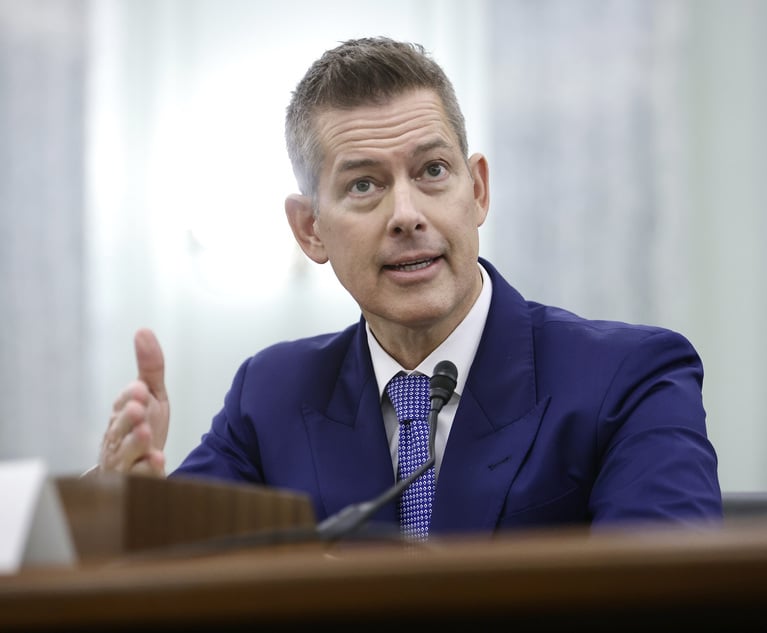Technology: Will your business have a say in how the Internet is run?
FCC Commissioner Robert McDowell recently delivered a speech warning that the effort to radically reverse the long-standing international consensus to keep governments from regulating core functions of the Internets ecosystem has been gaining momentum. The reach, scope and seriousness of this effort are nothing short of massive.
March 09, 2012 at 05:20 AM
6 minute read
The original version of this story was published on Law.com
FCC Commissioner Robert McDowell recently delivered a speech warning that “the effort to radically reverse the long-standing international consensus to keep governments from regulating core functions of the Internet's ecosystem has been gaining momentum. The reach, scope and seriousness of this effort are nothing short of massive.”
Head of the National Telecommunications and Information Administration Larry Strickling has likewise sounded the alert about efforts “to shoehorn the Internet into a supranational regulatory body where it simply doesn't belong….An Internet constrained by an international treaty will stifle the innovators and entrepreneurs who are responsible for its awesome growth.”
What are these top U.S. officials talking about? And why does it matter to the entire business community?
They are talking about a global conference this December to discuss the renegotiation of a treaty called the International Telecommunication Regulations (ITR), where certain governments may try to seize control of the Internet.
Since the Clinton Administration, the Internet has been managed by the Internet Corporation for Assigned Names and Numbers (ICANN) and other private organizations that make Internet policy through a process that invites all stakeholders—governments, businesses, non-governmental organizations and individuals—to participate. This “multi-stakeholder model” of governance offers businesses an active voice in the making of Internet policy.
Not everyone is convinced that the economic growth produced by a light regulatory touch or an open policy making process has benefited them. Citing national sovereignty, the need for development funding and diminishing revenues from telephony and other older technologies, several emerging nations have demanded government control of the Internet. Led by Brazil, India, Russia and China, they have proposed taking away ICANN's authority over the Internet addressing system and giving it to a U.N. organization such as the International Telecommunication Union.
Complaints that the multi-stakeholder model does not serve everyone's national interest are as old as the Internet itself. What is new is that this December's global conference on the ITRs will provide a forum and, more significantly, a negotiating platform. Efforts to update an old treaty that regulates radio and telephone communications (the ITRs were adopted in 1988) could be exploited to give the U.N. authority over the technical system by which the Internet operates as a global network.
Businesses have good reason to resist this power play.
The Internet has been an astonishing engine of economic growth and technical innovation because in most places it has been regulated lightly based on policies in which businesses had a significant voice. Exchanging that approach for the top-down regulatory model demanded by emerging nations would stifle growth and innovation, if not choke it off altogether.
Worse yet, giving the U.N. control of Internet governance would deny businesses direct participation in deciding how the Internet is run. Decisions about what equipment to use, what software protocols are valid, what Internet names and numbers are available for use and many other core Internet policies would then be decided in a room filled with diplomats where the door is locked and a sign reads “Governments Only.”
Every business has a compelling interest in avoiding this result. Businesses, no less than governments, should have a say in how the Internet is run.
FCC Commissioner Robert McDowell recently delivered a speech warning that “the effort to radically reverse the long-standing international consensus to keep governments from regulating core functions of the Internet's ecosystem has been gaining momentum. The reach, scope and seriousness of this effort are nothing short of massive.”
Head of the National Telecommunications and Information Administration Larry Strickling has likewise sounded the alert about efforts “to shoehorn the Internet into a supranational regulatory body where it simply doesn't belong….An Internet constrained by an international treaty will stifle the innovators and entrepreneurs who are responsible for its awesome growth.”
What are these top U.S. officials talking about? And why does it matter to the entire business community?
They are talking about a global conference this December to discuss the renegotiation of a treaty called the International Telecommunication Regulations (ITR), where certain governments may try to seize control of the Internet.
Since the Clinton Administration, the Internet has been managed by the Internet Corporation for Assigned Names and Numbers (ICANN) and other private organizations that make Internet policy through a process that invites all stakeholders—governments, businesses, non-governmental organizations and individuals—to participate. This “multi-stakeholder model” of governance offers businesses an active voice in the making of Internet policy.
Not everyone is convinced that the economic growth produced by a light regulatory touch or an open policy making process has benefited them. Citing national sovereignty, the need for development funding and diminishing revenues from telephony and other older technologies, several emerging nations have demanded government control of the Internet. Led by Brazil, India, Russia and China, they have proposed taking away ICANN's authority over the Internet addressing system and giving it to a U.N. organization such as the International Telecommunication Union.
Complaints that the multi-stakeholder model does not serve everyone's national interest are as old as the Internet itself. What is new is that this December's global conference on the ITRs will provide a forum and, more significantly, a negotiating platform. Efforts to update an old treaty that regulates radio and telephone communications (the ITRs were adopted in 1988) could be exploited to give the U.N. authority over the technical system by which the Internet operates as a global network.
Businesses have good reason to resist this power play.
The Internet has been an astonishing engine of economic growth and technical innovation because in most places it has been regulated lightly based on policies in which businesses had a significant voice. Exchanging that approach for the top-down regulatory model demanded by emerging nations would stifle growth and innovation, if not choke it off altogether.
Worse yet, giving the U.N. control of Internet governance would deny businesses direct participation in deciding how the Internet is run. Decisions about what equipment to use, what software protocols are valid, what Internet names and numbers are available for use and many other core Internet policies would then be decided in a room filled with diplomats where the door is locked and a sign reads “Governments Only.”
Every business has a compelling interest in avoiding this result. Businesses, no less than governments, should have a say in how the Internet is run.
This content has been archived. It is available through our partners, LexisNexis® and Bloomberg Law.
To view this content, please continue to their sites.
Not a Lexis Subscriber?
Subscribe Now
Not a Bloomberg Law Subscriber?
Subscribe Now
NOT FOR REPRINT
© 2025 ALM Global, LLC, All Rights Reserved. Request academic re-use from www.copyright.com. All other uses, submit a request to [email protected]. For more information visit Asset & Logo Licensing.
You Might Like
View All


After Botched Landing of United Airlines Boeing 767, Unlikely Plaintiff Sues Carrier
5 minute read
DOT Moves to Roll Back Emissions Rules, Eliminate DEI Programs
Trending Stories
Who Got The Work
J. Brugh Lower of Gibbons has entered an appearance for industrial equipment supplier Devco Corporation in a pending trademark infringement lawsuit. The suit, accusing the defendant of selling knock-off Graco products, was filed Dec. 18 in New Jersey District Court by Rivkin Radler on behalf of Graco Inc. and Graco Minnesota. The case, assigned to U.S. District Judge Zahid N. Quraishi, is 3:24-cv-11294, Graco Inc. et al v. Devco Corporation.
Who Got The Work
Rebecca Maller-Stein and Kent A. Yalowitz of Arnold & Porter Kaye Scholer have entered their appearances for Hanaco Venture Capital and its executives, Lior Prosor and David Frankel, in a pending securities lawsuit. The action, filed on Dec. 24 in New York Southern District Court by Zell, Aron & Co. on behalf of Goldeneye Advisors, accuses the defendants of negligently and fraudulently managing the plaintiff's $1 million investment. The case, assigned to U.S. District Judge Vernon S. Broderick, is 1:24-cv-09918, Goldeneye Advisors, LLC v. Hanaco Venture Capital, Ltd. et al.
Who Got The Work
Attorneys from A&O Shearman has stepped in as defense counsel for Toronto-Dominion Bank and other defendants in a pending securities class action. The suit, filed Dec. 11 in New York Southern District Court by Bleichmar Fonti & Auld, accuses the defendants of concealing the bank's 'pervasive' deficiencies in regards to its compliance with the Bank Secrecy Act and the quality of its anti-money laundering controls. The case, assigned to U.S. District Judge Arun Subramanian, is 1:24-cv-09445, Gonzalez v. The Toronto-Dominion Bank et al.
Who Got The Work
Crown Castle International, a Pennsylvania company providing shared communications infrastructure, has turned to Luke D. Wolf of Gordon Rees Scully Mansukhani to fend off a pending breach-of-contract lawsuit. The court action, filed Nov. 25 in Michigan Eastern District Court by Hooper Hathaway PC on behalf of The Town Residences LLC, accuses Crown Castle of failing to transfer approximately $30,000 in utility payments from T-Mobile in breach of a roof-top lease and assignment agreement. The case, assigned to U.S. District Judge Susan K. Declercq, is 2:24-cv-13131, The Town Residences LLC v. T-Mobile US, Inc. et al.
Who Got The Work
Wilfred P. Coronato and Daniel M. Schwartz of McCarter & English have stepped in as defense counsel to Electrolux Home Products Inc. in a pending product liability lawsuit. The court action, filed Nov. 26 in New York Eastern District Court by Poulos Lopiccolo PC and Nagel Rice LLP on behalf of David Stern, alleges that the defendant's refrigerators’ drawers and shelving repeatedly break and fall apart within months after purchase. The case, assigned to U.S. District Judge Joan M. Azrack, is 2:24-cv-08204, Stern v. Electrolux Home Products, Inc.
Featured Firms
Law Offices of Gary Martin Hays & Associates, P.C.
(470) 294-1674
Law Offices of Mark E. Salomone
(857) 444-6468
Smith & Hassler
(713) 739-1250






